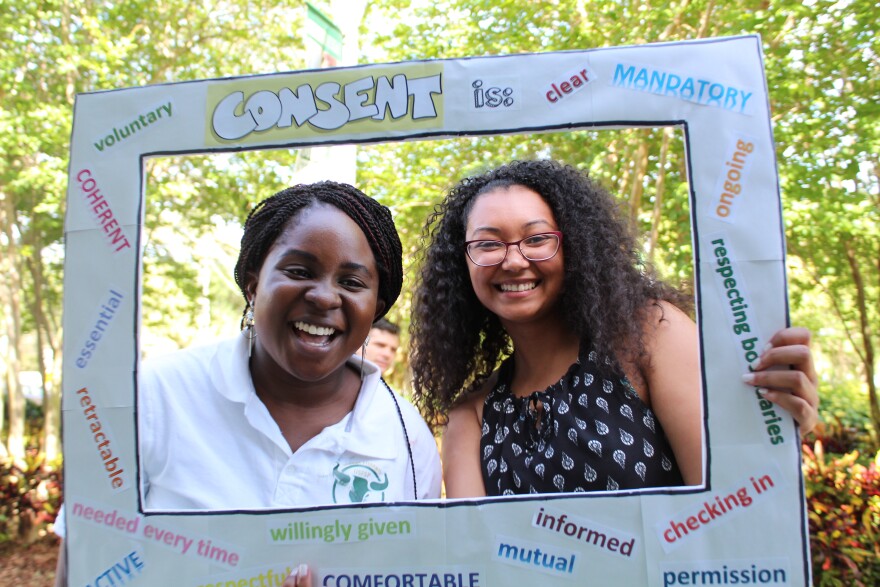When she finished high school, Radhika Dang wanted to go to the University of South Florida, but got turned down from the Tampa campus.
The American-born Indian student, who grew up in Queens, was denied because her grades were too low. But she could go to USF St. Petersburg.
The 23-year-old worked as a campus tour guide and started a South Asian Association club to celebrate her culture. She excelled in the classroom, earning her English education bachelor’s degree in three years. Now she's working on a Master's in Liberal Arts.
“If somebody had not given me that chance or said, hey, you have a lower GPA, but we think we can trust you and we think you are going to make the effort to push forward and do great things, I don’t know where I would be,” said Dang.
USF St. Petersburg actively uses diversity to attract more minority students who might not get into larger state universities.
But those students make up a small portion of the student body. Latino students 17 percent. Black students about 8 percent. And Asian students like Dang? Only 3 percent.

Some worry that might get worse.
That’s because of a plan to consolidate the Sarasota-Manatee and St. Petersburg campuses under Tampa control. That will take effect by 2020.
The merger would make the USF system a pre-eminent state university, meaning more funding. But it would also raise admission standards.
Community leaders in Pinellas County think that would create a “barrier of entry,” particularly for incoming minority freshmen.
These students typically have high school grade point averages around a 3.5 — about a B average. The details are still being worked out, but the best guess so far is a 3.8 will be needed for admission.
University officials say, faster graduation, fewer dropouts and less student debt are proven to be easier to achieve by admitting higher performing students.
For Ken Welch, those reasons ring hollow. He’s chair of the Pinellas County Commission and a 1985 USFSP graduate.
“That’s going to cut out a whole swath of Pinellas County students. I wouldn’t have been able to attend USF and I’m a Bull,” Welch said at a recent event in Tampa.
St. Petersburg City Council mirrored that theme in February in a letter sent to state lawmakers, which cited “questions about enrollment and minority access.”

The university is responding to those concerns, according to interim Regional Chancellor Martin Tadlock. He said they’re trying to find ways to keep admitting those students.
“That’s the pool of students we want to continue to provide access to and make sure we don’t deny opportunities for those students because they’re the ones that really represent the diversity we want to see on campus,” Tadlock said.
To prepare for the consolidation effort, the college is working to put in place programs and scholarships for those students who don’t meet the increased requirements, said Cecil Howard, USF St. Petersburg's chief diversity officer.
"What we're doing is trying to be as proactive as we possibly can to try not to be impacted by any increase in admission requirements," said Howard, who is also the interim chief diversity officer for the Tampa campus.
USF St. Petersburg also recruits high achieving students like senior David Thompson. He’s one of only a few black students to serve as student body president in the campus' more than 50 year history.

“Yes, there are the people who are like me, who did have a good GPA, and the changing GPA wouldn't affect us,” Thompson said. “But what about the other students who aren’t necessarily being pushed or have the resources to excel?”
While at USF St. Petersburg, Radhika Dang has become a recognizable figure on campus. She was a student assistant in the College of Arts and Sciences and now works as an administrative specialist on campus. But she's most known for the two Indian festivals she hosts every year.

To Dang, raising the entrance requirements is another blow against a university, that she says, doesn’t value diversity.
“I feel like, and this is really hurtful for me to say, our university prides itself on diversity, our slogan says diversity in it, yet there is none,” she said.
She finds it difficult to be heard and struggles to find funding from Student Government for the annual festivals. She also says the university has been slow to hire South Asian faculty and recruit more students.
Despite all that, USF St. Petersburg changed her life.
“I would probably be stuck in a community college, which is sad to think that that is what’s going to happen to a lot of minority students, who are going to have to go to community college before they can even think about coming to a place like this,” Dang said.




